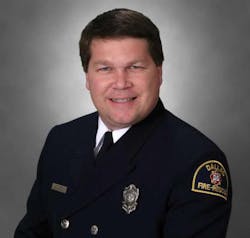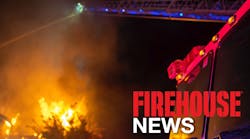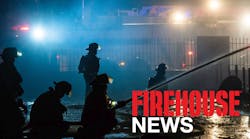Tactical errors by commanders and miscommunication led to the death of a Dallas firefighter last year in a six-alarm blaze, according to a pair of official investigations released Thursday.
The state fire marshal and Dallas Fire-Rescue line-of-duty death investigations detail the spread of the fire, confusion among commanders and decisions leading up to the death of Stanley Wilson on May 20, 2013.
The reports offer a few conflicting accounts about what happened that night, but several firefighters allege that Deputy Chief Bobby Ross ordered Wilson and three other firefighters back into a collapsing condominium building hours after the fire had started.
The state report faulted commanders’ failure to properly assess the fire, the structure and available personnel. It also raised questions about their supervision and decisions on how to battle the blaze and whether to search buildings.
The reports were released to the public by the attorney for Jenny Wilson, the firefighter’s widow.
The Dallas Fire-Rescue line-of-duty death report often matches public comments previously made by Wilson’s longtime friend Jim Crump, a retired Dallas firefighter.
Crump said Thursday that reading the reports “made me want to cry.” He said he believes Ross was careless.
“Regardless of how well-meaning he thought he was, he broke every rule that is established for a fire commander,” Crump said. “And it cost Stan Wilson his life.”
Ross declined to comment Thursday through Dallas Fire-Rescue spokesman Lt. Joel Lavender.
Lavender also declined to comment on the contents of the report because it had yet to be officially released. He said Fire Chief Louie Bright gave the report to Jenny Wilson on Wednesday so she could read it and ask questions before the department released it publicly. Bright is expected to give a statement on the report Friday.
Widow sought reports
Wilson’s widow had been pushing for the report’s release for months after remaining mostly silent publicly for a year after her husband’s death. She said Thursday that she was disappointed by the report’s emphasis on miscommunication and confusion at the scene.
“They were almost acting like Dallas had never been in a six-alarm fire before,” she said.
According to the line-of-duty report, the deadly blaze started shortly before 3 a.m. in a trash chute of a condominium complex in the 12300 block of Abrams Road in far northeast Dallas. There were fire sprinklers in the chute, but the building’s water supply had been shut off temporarily because the property manager had discovered that a resident had built an irrigation system to grow marijuana.
Wilson and the other firefighters on Truck 53 arrived at the complex after the fire went to three alarms, and firefighters at the scene already had switched to defensive tactics. By then, firefighters had searched the building where Wilson eventually died.
Several of the condos in that building collapsed after 4 a.m. and more were fully engulfed in flames. Water was pounding the building from aerial ladder pipes, effectively collapsing the building.
The report said Ross regularly left his command post, which contributed to confusion. Ross was in charge of directing firefighting operations at the scene.
About 4:40 a.m., section chief George Tomasovic asked Ross what he needed. Tomasovic said Ross replied, “They are still pulling people out from the first floor. There is still a portion of the first floor that hasn’t been searched. Take Truck 53 and make a quick search of the first floor.” Tomasovic said Ross added: “Make it real quick.”
But Ross told investigators he said to Tomasovic, “Get you a crew together, get pike poles, and I want you to break out ... windows on the first floor” of one side of the burning building. Ross told investigators he thought the sound of breaking glass would rouse anyone still inside.
Some firefighters told investigators Ross was confused when he heard about the search later and heard him say something about pike poles. But several other firefighters at the scene backed Tomasovic’s account.
The report states that investigators asked the three surviving members of Wilson’s truck whether there was any chance Ross said the words pike poles, which would indicate that the firefighters should remain outside the structure. All of them flatly denied Ross said those words.
Crump said Ross’ explanation was “absurd.”
“If there is the thought that somebody is inside the structure, and a person decides to run around the outside of a building and break glass, that person will be given time off,” he said. “That’s something you don’t do.”
A captain said he asked Tomasovic whether they were to search the building with the ladder pipes still blasting water on the building, a maneuver that would have placed anyone inside in danger. He said Tomasovic indicated he wasn’t really sure what exactly they were doing.
Searching for victims
Although more than an hour had passed since the last civilian was rescued from the building, the crew of four from Truck 53 — including Wilson — went in and began searching. Five minutes later, the building started to collapse.
Tomasovic was briefly trapped by collapsing debris. Other firefighters pulled him to safety. A Mayday call went out, signaling distress.
The Dallas report said, “Several of the fire crews interviewed regarding the Mayday expressed surprise that anyone would have been inside” the building “for any reason” then.
Wilson didn’t make it out and was crushed. His body was found hours later.
Crump said Ross, who has been with the department since 1984 and remains a deputy chief, should have been fired soon after Wilson’s death.
Lavender said he could not comment on personnel matters but added that neither Ross nor anyone else connected to the fire is the target of an internal affairs investigation.
Both reports on the fire recommended several changes, including more training and a re-evaluation of some tactical procedures. But Crump called some of the recommendations “a slap in the face” because the department already follows them.
Barry Hasten, Jenny Wilson’s attorney, said the reports show that Wilson and other firefighters never should have been ordered back into the building.
“We’re fortunate we didn’t lose four firefighters that day,” Hasten said. “And if things don’t change, we’re going to lose more.”
Wilson said she thinks the fire department is holding back more information.
“I just want better answers,” she said.
———
©2014 The Dallas Morning News
Visit The Dallas Morning News at www.dallasnews.com
Distributed by MCT Information Services






